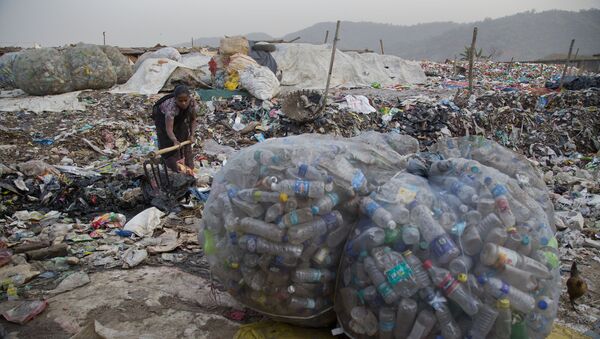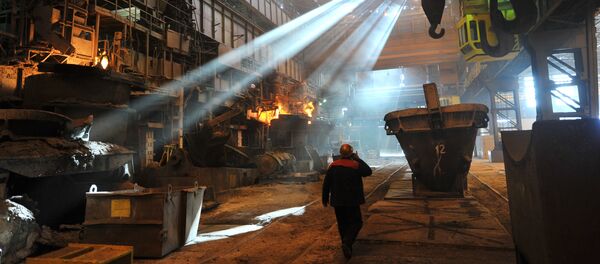New Delhi (Sputnik) — While globally there is an outcry against the excessive use of plastics amid concerns they could eventually choke the planet, Rajagopalan Vasudevan, professor of chemistry at Thiagarajar College of Engineering, Madurai, has developed a technology that enables waste plastic to be used in flooring and the construction of roads. He patented the technology in 2002 and more than 50,000km of the road has been laid in India since then, using the new method of re-using waste plastic. Recently, acknowledging the contribution of Prof Vasudevan, the Government of India made it mandatory for use of waste plastic in road constructions.
Popularly called the "Plastic Man of India," Professor Vasudevan was recently in Delhi to receive India's third highest civilian award, "Padma Shri," conferred by the president.
#PresidentKovind presents Padma Shri to Prof Rajagopalan Vasudevan. He patented a method to reuse plastic waste to construct roads. He gave the technology to the Government for free and 5,000 km of road has been built across 11 states pic.twitter.com/Fo348no1RE
— President of India (@rashtrapatibhvn) March 20, 2018
Sputnik talked to Professor Vasudevan to understand more about the technology.
Sputnik: Professor Vasudevan, congratulations for having been honored with the "Padma Shri" award. Please tell us more about the technology that you have developed and the importance of it in the Indian context.
Prof Rajagopalan Vasudevan: In India, like the world over, disposal of plastic waste is a major challenge. Presently, waste plastics are either landfilled or incinerated. Both processes are non-technical and it will affect the environment in the near future. After studies, we concluded that use of waste plastic in road construction is a suitable solution for the disposal of waste in an eco-friendly way and thus avoiding the pollution created by the plastics in the environment. In this context, since the project of plastic road laying avoids landfilling and incineration of waste plastics, it is considered as an effective process for the disposal of waste plastics.
READ MORE: Great Pacific Garbage Patch Now Bigger Than Texas, Scientists Say
First, we attempted to modify bitumen by dissolving plastics in bitumen. This was partly successful but we could dissolve only lower percentages of plastic in bitumen. Later we developed a newer method by coating waste plastics over hot stone aggregate and used the same for road construction. Here the consumption of waste plastics is high and hence we patented it and the Indian Road Congress coded it in 2013. For a 1km length road of width 3.75m, we need one ton of plastics. India has 41 lakhs km of roads. If all the roads are converted/made to plastic tar road, we need more than 100 lakh tons of waste plastics and practically India does not have this much waste plastics. We have only 16 lakhs tons of waste plastics only. That is the scope and future of this technology.
Padma Awardee Prof. Rajagopalan Vasudevan shares his thoughts on #PeoplesPadma in the interaction hosted by @HMOIndia on 19th March. Honour the efforts of the changemakers like him by sending your wishes through personalized cards. Visit https://t.co/PVkrVbdVl4 pic.twitter.com/g4oz6HicO3
— #TransformingIndia (@transform_ind) March 23, 2018
Sputnik: In what other areas can waste plastic be put to good use?
Prof Rajagopalan Vasudevan: We have developed further use as well. Further works helped us to develop other products with the combination of plastic and stone. We have named it Plastone blocks, which is a substitute for paver blocks. This product consumes a large amount of waste plastics. Plastone blocks can be used as roadside paver block. The Plastone blocks manufacturing process also helps in the reduction in the use of cement, sand and water, since the process uses waste plastics as a binder. Hence by using these two technologies, almost all the plastic waste available in India can be reused and the disposal of waste plastics will no longer be a problem.
Sputnik: Don't you think collecting the used plastic in itself is a huge challenge in India? How would you overcome that?
Prof Rajagopalan Vasudevan: Once this technology gets into complete use, the waste plastics which were once thrown into the streets will get a value addition. The use of waste plastics in road construction and flooring block projects directly creates a demand for waste plastics in the market. Already in many states, the self-help group and some other NGOs are been involved in the process of collection waste plastics. They collect and shred the waste plastics and sell it to the concerned authorities for Rs 20 to 25 per kg. This becomes a good employment.
Sputnik: We came to know that your university's campus roads are all constructed with the help of this new technology. What has been the response of the government?
Prof Rajagopalan Vasudevan: In India, almost 11 states have implemented this technology till now. The government is using the PMGSY (Prime Minister's rural road project) scheme fund for laying plastic roads in rural road sectors. The Central Pollution Control board had published guidelines for laying plastic roads in the year 2006 itself.
83,000km road in 5 years built from PLASTIC WASTE?
— Surprising Lagos (@SurprisingLagos) January 24, 2018
The technology for this was developed by the ‘Plastic Man’ of India, Prof Rajagopalan Vasudevan, Professor of Chemistry.
Report >> https://t.co/yX0FOs0jaT@ClimateWed @taiwoadewole@Hasshabie @RecyclePointsNG#WEF18 @BBCWorld pic.twitter.com/hrkt4mZ1EZ
Sputnik: What has been the result on the ground? What are the gains of using this technology?
Prof Rajagopalan Vasudevan: The overall consumption of bitumen is less by 10 to 15% and thus the coat is reduced. By laying a 1km single lane plastic road, 10 lakhs carrier bags are consumed while saving 1 ton of bitumen (Rs 40,000). It also helps to avoid the entry of 3 tons of CO2 into the atmosphere, if it is otherwise disposed of by burning. Value addition to waste plastics is being created. Use of pavement scrap waste for plastic tar road reduces the cost by 50%. Plastic tar road has double strength, compared to ordinary bitumen road. It can withstand both heavy load and heavy traffic. It is not affected by rain or stagnated water. And hence no pothole is formed. There is no rutting and raveling. The life of the road is not less than seven years and there is no need for maintenance expenditure. Performance studies of the plastic tar road were carried out as per Central Road Research Institute specification and the results are very good.
READ MORE: Russian Scientists Create Environmentally Friendly Film Packaging
Sputnik: What are the challenges you have faced in this mission? Do you think the transition from conventional road making techniques to your innovative technology is going to be easy?
Prof Rajagopalan Vasudevan: The process is very simple and in situ, no external industries are involved. The plastic tar roads are performing very well even after 10 years without any permanent deformations like rutting, raveling, edge cracking and potholes. Yet the technology is faced with many challenges like a proper collecting mechanism of used plastic awareness among the stakeholders, including policy makers, and technology group is less and they show less interest in the process. Presently, the addition of waste plastics in process of road laying is done manually. If the process is automated the process will become still more successful. Scaling up the processes of using the technology is also a major challenge.
The views and opinions expressed by Prof Rajagopalan Vasudevan in this article are those of the speaker and do not necessarily reflect the position of Sputnik.


